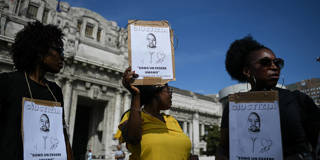Italians were outraged when no one intervened to help a Nigerian street vendor as he was attacked and killed last month by a man using his bare hands in the middle of the day on a busy street in the town of Civitanova Marche. But with 49 million people at imminent risk of famine, many governments are behaving similarly.
MELBOURNE – In March 1964, the New York Times reported that 38 witnesses saw or heard a brutal, drawn-out, and ultimately fatal attack on a woman called Kitty Genovese, but none did anything to help her, or even summoned the police. The report was later shown to be erroneous, but the “bystander effect” is real. As many psychology experiments have shown, an individual is less likely to come to the aid of another if they can see that other people who could help are not doing so.
Last month, in the middle of the day on a busy street in the Italian town of Civitanova Marche, Alika Ogorchukwu, a Nigerian street vendor, was attacked and killed by a man using his bare hands. Although the police were called, and someone filmed the attack, no one intervened. Amid general outrage, an editorial in the Italian newspaper La Stampa took this as a sign that we are in “the twilight of civilization.”
If you had been there, would you have aided Ogorchukwu? Consider, before you answer, that to intervene would have involved some personal risk. The assailant was not using a weapon, but how could you know that he did not have one? And even without a weapon, he was evidently both enraged and strong.

MELBOURNE – In March 1964, the New York Times reported that 38 witnesses saw or heard a brutal, drawn-out, and ultimately fatal attack on a woman called Kitty Genovese, but none did anything to help her, or even summoned the police. The report was later shown to be erroneous, but the “bystander effect” is real. As many psychology experiments have shown, an individual is less likely to come to the aid of another if they can see that other people who could help are not doing so.
Last month, in the middle of the day on a busy street in the Italian town of Civitanova Marche, Alika Ogorchukwu, a Nigerian street vendor, was attacked and killed by a man using his bare hands. Although the police were called, and someone filmed the attack, no one intervened. Amid general outrage, an editorial in the Italian newspaper La Stampa took this as a sign that we are in “the twilight of civilization.”
If you had been there, would you have aided Ogorchukwu? Consider, before you answer, that to intervene would have involved some personal risk. The assailant was not using a weapon, but how could you know that he did not have one? And even without a weapon, he was evidently both enraged and strong.